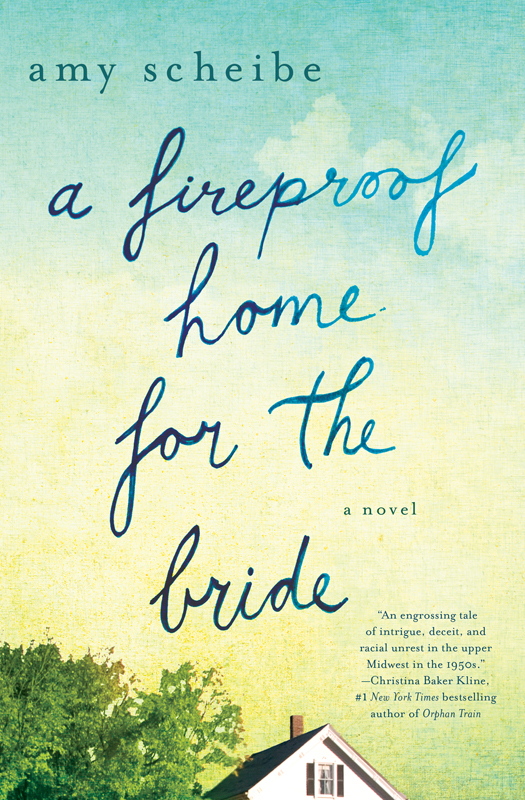
A Fireproof Home for the Bride
A Novel
کتاب های مرتبط
- اطلاعات
- نقد و بررسی
- دیدگاه کاربران
نقد و بررسی

Starred review from January 12, 2015
Scheibe's fantastic sophomore effort (after What Do
You Do All Day?) explores the coming of age of a young
Minnesota woman in the late 1950s. Eighteen-year-old Emmy Nelson lives with her joyless, domineering mother, Karin, and feels resigned to her fate of becoming a farm
wife. She's known her betrothed, Ambrose Brann, all her life, but lately he's been hostile and abusive. After glimpsing the possibility of a happier life with the help of her best friend, Bev Langer, and her high school guidance counselor, Mr. Utke, Emmy breaks off her engagement and begins seeing Bobby Doyle, a Catholic boy with big dreams. Meanwhile, Ambrose falls under the spell of bigoted family friend Curtis Davidson, whose fear-mongering politics scapegoat the area's Mexican immigrants. As she grows into a cub reporter job, Emmy discovers that the politics might tie into a family secret. Emmy is used to mystery when it comes to her relatives: something big caused her grandmother's estrangement from Emmy's great-aunt. Scheibe's multilayered plot feels organic: the strands are knitted into a tight story of substance that touches on the politics of race, class, and gender without coming off as too preachy. There are a few small flaws: Emmy, for instance, seems awfully progressive for someone who has known nothing but her dour, religious family, and influential bestie Bev abruptly drops out of the story, but overall, the book is spectacular.

January 1, 2015
Scheibe (What Do You Do All Day?, 2006) chronicles a Minnesota girl's journey toward independence in a story set in 1958 with pointed contemporary parallels.Eighteen-year-old Emmy Nelson has known for years that she's expected to marry Ambrose Brann, but since her father moved the family off the farm to a bigger town on the North Dakota border, she feels her horizons expanding beyond her mother Karin's cramped notions of the proper destiny for a good Lutheran girl. She re-establishes contact with long-estranged, more easygoing relatives and gets a job on the switchboard at the local newspaper, learning the basics of journalism with the help of a friendly reporter. Emmy's growing maturity is well-portrayed, as is postwar life in the rural Midwest, still very much governed by traditional values-which, in the author's stinging depiction, include racism, sexism and xenophobia. Scheibe's indictment would be more persuasive if it weren't so overdone: It's not enough for Ambrose to be 10 years older than Emmy and creepily under the thumb of the sinister Curtis Davidson; he has to rape her, and when she tells Karin Ambrose hit her, her mother's response has to be, "How did you provoke him?" The unfolding story also includes three other rapes, a murder pinned on an innocent Mexican, two suspicious fires and another climactic piece of arson, all of them blatantly designed to make it clear just how dangerous Davidson and his Citizens' Council are. Revelations about a dead relative in the Ku Klux Klan and a nice Catholic boy who turns out to be gay add to the overheated tone and will come as no surprise to attentive readers. When a rural crowd listening to Davidson rant about low-income housing and shiftless immigrants begins chanting, "Citizens united, can't be divided," it's clear the author intends readers to make the connection between then and now, but she sabotages her case by making it so luridly. A good coming-of-age story lies buried underneath a ridiculously overdetermined and didactic plot.
COPYRIGHT(2015) Kirkus Reviews, ALL RIGHTS RESERVED.

February 15, 2015
In her second title (after What Do You Do All Day?), Scheibe presents a lengthy coming-of-age tale set in rural 1950s Minnesota. Eighteen-year-old Emmaline's future has been decided: she will marry the wealthy neighbor's son, thereby joining two family farms and ensuring financial stability for her aging parents. Emmy is a guileless, likable protagonist who nevertheless defies her sheltered Lutheran upbringing by boldly taking charge of her life's course. Fans of Kathryn Stockett will identify strongly with the agonizing choices Emmy must make as ugly family secrets concerning racial hatred emerge. The author artfully folds fashion, cars, and music references into the story, and readers will delight in the surprise twist on the 1950s-style love affair that at first appears to be the perfect solution to the heroine's woes. VERDICT The narrative drags somewhat in the middle, but the action picks up again as Emmy hurtles through wintry obstacles (without her boots) toward an ending that is as neat as a well-darned sock. [See Prepub Alert, 9/22/14.]--Erin O. Romanyshyn, Frances Morrison Central Lib., Saskatoon, Sask.
Copyright 2015 Library Journal, LLC Used with permission.

March 15, 2015
Expectations can be used to build prisons just as effectively as concrete and steel can. For 18-year-old Emmaline, leading a stifling existence in a strict Lutheran Minnesota community during the 1950s, the path ahead is clear. She is to marry her childhood friend Ambrose and support his ambitions while tending to their family in much the same grim existence that her parents have endured. But when she begins to step outside the confines of her upbringing, and, in particular, gains the attention of a charming Catholic boy, she not only sees that another life is possible, but also starts unraveling secrets in her family's past. The novel's careful pacing slowly builds upon its revelations of the dark undercurrent of racism and bigotry saturating the community, lending an atmosphere of dread to even everyday occurrences. Scheibe devotes the same attentiveness to Emmy's growth, as Emmy painstakingly develops the confidence to stand up for herself and for what she believes is right. Barriers aren't always broken down with a wrecking ballmore often, it's done one brick at a time.(Reprinted with permission of Booklist, copyright 2015, American Library Association.)

























دیدگاه کاربران